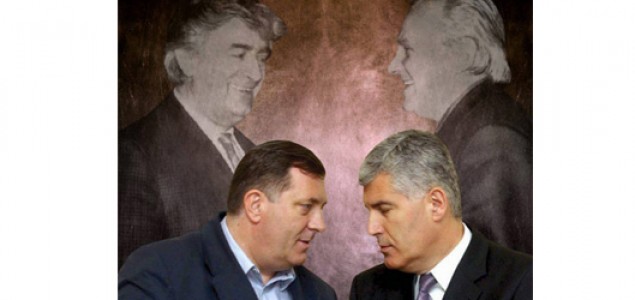Act now to prevent war in Bosnia and Herzegovina!
Izdvajamo
- Urgent action is vital in order to prevent another bloody war. In the absence of firm opposition and robust sanctions the prospect looms of thousands more deaths and widespread destruction and suffering. Another war would lead to another major mass flight of refugees to Europe – and the final collapse of the European idea.
Povezani članci
- Bertoncelj: Klasična životna osiguranja su posao budućnosti
- GAZEĆI PREKO MRTVIH VARALI ŽIVE: Kako su u „Gradskom groblju“ BL zataškali dugogodišnju pljačku unesrećenih
- Srbija danas bira predsjednika, parlament i vlast u Beogradu
- PRILOG RASPRAVI O DEMOKRACIJI I ANTIFAŠIZMU
- KIBICERI U TRANSU…
- Opozicija traži referendum građana Novog Sarajeva

Urgent Appeal from Gesellschaft für bedrohte Völker International (GfbV-Int) / Society for Threatened Peoples International (STP – Int) to EU Member States, the USA and Others
on the anniversary of the signing of the Dayton Peace Agreement (21.11.1995 in Dayton /14.12.1995 in Paris)
The frozen war in Bosnia and Herzegovina is heating up – the EU and the international community must act!
26 years ago the signing of the Dayton Peace Agreement brought the nearly four-years-long war in Bosnia and Herzegovina (1992-1995) to an end. The peace settlement was achieved at the cost of the country’s de facto partition. The causes of the conflict in Bosnia and Herzegovina were never dealt with: they were left frozen and unresolved. The country’s multiethnic population was left to the mercy of those same politicians who had been responsible for ethnic cleansing and genocide at Srebrenica and elsewhere in Bosnia. Unless the EU is prepared to take action immediately, war is once again going to break out in the heart of Europe.
For years Gesellschaft für bedrohte Völker (GfbV) / Society for Threatened Peoples (STP) and other human rights organizations worldwide have warned that the situation on the ground was becoming critical, but to no effect. However the intensifying radicalisation of attitudes in the Bosnian Serb entity of Republika Srpska and also in Serbia can no longer be ignored. Since 2011 the Serbs’ current representative in the Bosnian Presidency has been talking quite openly of Republika Srpska seceding from Bosnia and forming a union with Serbia. For years the EU member States and the USA have simply ignored his threats.
The situation has now escalated, to coincide with the enactment of the law against denial of war crimes and genocide at Srebrenica that was introduced by the international community’s former High Representative Valentin Inzko towards the end of his term of office in July 2021. Politicians from Republika Srpska have used this law as an excuse to bring the country’s administration to a halt and boycott the routine administration functions of official institutions. This general program of non-co-operation even extended as far as ordering the new High Representative, Christian Schmidt, not to report to the UN Security Council on the situation in Bosnia and Herzegovina. Russia and China prevented him from making his planned appearance before the Council at the beginning of November 2021.
In the meanwhile the USA and the EU have been made aware that the crisis in Bosnia and Herzegovina cannot be left to resolve itself. The EU is divided over what should be done. Numerous Members of the European Parliament, along with politicians from the USA, the United Kingdom and Germany, have called for the adoption of sanctions against Milorad Dodik and his supporters. Germany’s current Foreign Minister Heiko Maas has spoken out in support of such measures, but autocratically-inclined governments of some EU member states such as Hungary, Poland and Slovenia in particular oppose sanctions.
Several EU Member States see the crisis in Bosnia as offering an opportunity to advance their own interests. This cynical opportunism could have tragic consequences for Bosnia and Herzegovina as a country and also for its citizens. It wouldn’t be the first time this has happened.
Whatever its internal differences, it is high time for the EU, together with the USA, to take an unambiguous stance on the burgeoning crisis in Bosnia and Herzegovina. Milorad Dodik and his supporters, among them the President of Serbia Aleksandar Vučić, are set to unleash a new war in Europe in order to achieve the political aims of Radovan Karadžić, Ratko Mladić and Slobodan Milošević. They want to complete the criminal campaign against the entire non-Serb population that the Dayton Peace Agreement interrupted 26 years ago.
The USA, the United Kingdom and prominent EU Member States, Germany in particular, must unambiguously condemn radicalisation.
There must be no compromise with Croatian representatives of extremist politicians in Bosnia, Dragan Čović above all, who have been working with Milorad Dodik in pursuit of their common goal of destroying the Bosnian state. Dragan Čović glorifies the criminal parastate of Herzeg-Bosna in whose name countless crimes against humanity were committed against the non-Croat population during the Bosnian War. The perpetrators of those crimes were sentenced by the International Criminal Tribunal for the Former Yugoslavia (ICTY) to terms of imprisonment totalling 111 years.
An end to the current radicalisation of attitudes is long overdue, along with an end to Croatian and Serbian interference in internal affairs of their next-door neighbour. Without that, Bosnia and Herzegovina will never be able to enjoy the rewards of peaceful and democratic development.
The EU must insist that Croatian leaders in Zagreb end their nationalistic instrumentalisation of the Croat population of Bosnia and Herzegovina. The dubious ethno-nationalistic practices of an EU Member State must not be permitted to undermine the peace in a neighbouring country and across the wider region. Similar determination must be shown towards the Serbian leader, Aleksander Vučić: the Serbian leader has been stitting the embers of conflict not just in Bosnia and Herzegovina, but in Montenegro and Kosovo as well, and he has made it very clear that he is not yet ready to learn lessons from the terrible Balkan wars of the recent past.
The Dayton Peace Agreement may be flawed but it must be defended against the intentions of advocates for a Greater Serbia and a Greater Croatia, supported by Russia and China acting in their own geostrategic interest.
Politicians who interfere with the functioning of the State and jeopardise the peace must be targeted with smart sanctions. Otherwise their secessionist policies, ethno-nationalist hate speech, mockery of victims and denial of past crimes will lead to a new war that will claim many lives.
The European Union is not the same as it was in 1992. If it wants be taken seriously in the area of foreign and security policy, it must not repeat the mistakes of that time. It cannot simply ignore what is happening and allow genocide and war crimes to happen again. GfbV/STP calls on the European Union to take active measures against Serb and Croat nationalists in Bosnia and Herzegovina and Serbia. Such measures should include the halting of financial assistance from the EU, a ban on travel to EU countries and the freezing of overseas bank accounts. We also call for a thorough investigation of the financial dealings of Milorad Dodik and his supporters. The people of Republika Srpska and Serbia need to know just how their leaders have been enriching themselves from the proceeds of their criminal business activities. Many ordinary people are forced to choose between living in poverty or leaving home in search of employment and a decent life and migrating to the EU. Bosnia and Herzegovina must be allowed the opportunity to become a properly functioning state. The leaders of Republika Srpska and the HDZ in BiH have for years stood in the way of their country’s development, obstructing reforms needed for EU membership and preventing the punishment of war criminals.
Urgent action is vital in order to prevent another bloody war. In the absence of firm opposition and robust sanctions the prospect looms of thousands more deaths and widespread destruction and suffering. Another war would lead to another major mass flight of refugees to Europe – and the final collapse of the European idea.


 ENG
ENG





























